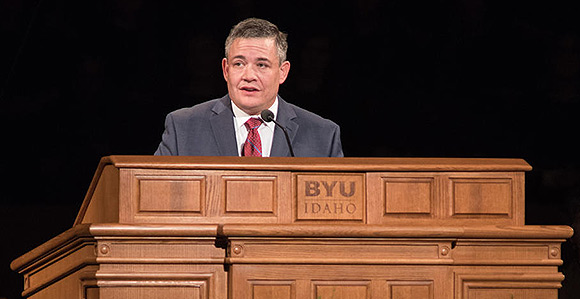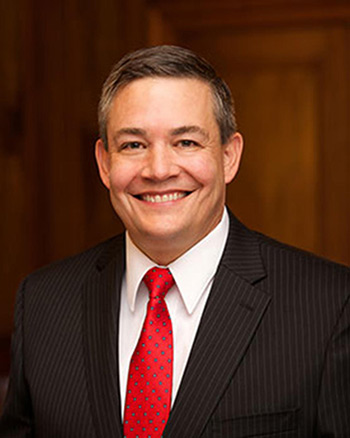All Can “Live Happily Ever After,” Brother Brough Tells BYU–Idaho Students
Contributed By Marianne Holman Prescott, Church News staff writer

Brother M. Joseph Brough, Second Counselor in the Young Men General Presidency, speaks at a BYU–Idaho devotional on October 17, 2017.
Article Highlights
- Our “happily ever after” comes from living the doctrine of Christ.
- Exact obedience includes repenting immediately when we make mistakes.
- If we are striving to follow the Lord, He will not let us stray without proper warning.
“We have the right to have the Holy Ghost always be with us, especially in crucial moments of life.” —M. Joseph Brough, Young Men General Presidency
Related Links
“Life is not a fairy tale, but I believe that as we end this life, everyone can experience the words ‘and they lived happily ever after,’” said Brother M. Joseph Brough, Second Counselor in the Young Men General Presidency, during a campus devotional at Brigham Young University–Idaho on October 17.
That “happily ever after” comes from heeding the voice of the Lord, living the doctrine of Christ, and making and keeping sacred covenants, he taught.
Speaking to students in the BYU–Idaho Center on the Rexburg campus, Brother Brough began by sharing a story of when he had been serving as mission president in Guatemala City. He and his wife had only been there for a short time and were traveling to a more remote zone. As they were traveling, they learned that a demonstration was blocking the road they were planning to travel. Knowing that demonstrations can take hours, the couple decided to take an alternate route—one they knew had a few risks—to their destination.
After driving for a while, the couple came to a spot on a dirt road that looked like a steep drop-off. Although a small branch had been dragged across the road in an effort to warn others to “proceed with caution,” the couple failed to register what it meant and were soon dangling off a 20-foot ledge where a bridge had washed out.
“Not knowing what to do, I paused outside the vehicle and pleaded with Heavenly Father: ‘Please help me in my moment of carelessness,’” he recalled saying. “Can you believe that a large banana truck suddenly pulled out onto the road from behind us?”
The driver and passengers saw the Broughs and came over to laugh and enjoy the predicament of the “silly gringo.” They pointed out the branch on the road.
“Wonderful young people attending BYU–Idaho, I tell you this story to make the point that we must heed warnings, promptings, and direction given us by the voice of the Lord—no matter how strong or mild,” he said. “That voice comes in many forms: scriptures, commandments, whisperings from the Holy Ghost, the words of the living prophets, parents—especially mothers, Church leaders, and good friends.
“Are we listening for and heeding these promptings and warnings? Why is it important to do so?”

Brother M. Joseph Brough, Second Counselor, Young Men General Presidency.
Quoting the scripture found in Proverbs 3:5–6, Brother Brough said: “Trust in the Lord with all thine heart; and lean not unto thine own understanding. In all thy ways acknowledge him, and he shall direct thy paths.”
“We must trust the Lord with all of our heart,” he said. “We must understand that our knowledge falls short of what is best for us and best for others. If we do trust in Him, what a wonderful promise He bestows: He will direct our paths.”
Crucial to the Lord directing one’s path is obedience, the leader taught.
“I am sure that I do not completely understand what exact obedience means, but here is what I have come to understand,” he said. “It is not perfect obedience; that is impossible. Hence, repentance must be a key part of exact obedience. …
“Exact obedience means as I make a mistake or commit a sin, the speed at which I start the repentance process is important. I need to immediately repent. I must use the repentance process whether my mistakes are large or small. And I must respond immediately.”
Exact obedience also requires a commitment to heed all the warnings and promptings and commandments Heavenly Father gives His children, he said.
“Sometimes we will be likewise surprised; we will not understand why Heavenly Father asks specific things from us,” he said. “Those can be some of the toughest times to be exactly obedient.”
Brother Brough told listeners that although some things the Lord asks may seem insignificant, the Savior never said, “If ye love me, keep the commandments that appear important.”
“There is one clear voice of warning that we must always heed,” he said. “That voice comes from the Lord’s chosen apostles and prophets. It might not be popular by the world’s standards, … but you can—no, you must—trust that it comes from Heavenly Father.”
Recognizing there are times that a person is seeking personal revelation, direction, and counsel from the Lord and feels as if they aren’t receiving an answer, Brother Brough reminded listeners that the Lord will “direct thy paths” as a person puts their trust in Him.
Remembering when he was deciding whom to marry, Brother Brough said he was in love with his wife and had fasted, prayed, attended the temple, and counseled with his parents—and still wasn’t sure if he should proceed.

Brother M. Joseph Brough and Sister Emily Jane Brough greet BYU–Idaho students at the end of a devotional on October 17, 2017.
“I have had such strong answers to many prayers, so why not an unmistakable answer to the most important of all requests that I had made to the Lord up to that point in my life?” he said. “I believe it was to teach me to listen to the still, small voice and not doubt. Furthermore, I have come to understand that if I am repentant, being exactly obedient, following my leaders, and making other good choices—in other words, if I am worthy—Heavenly Father will not let me make big mistakes without proper warning. Nor will He you. …
“My young friends, Heavenly Father is here to keep us from making very costly mistakes if we are seeking His warnings, promptings, and revelations from all available sources—and if we heed and act upon them. We have the right to have the Holy Ghost always be with us, especially in crucial moments of life.”
